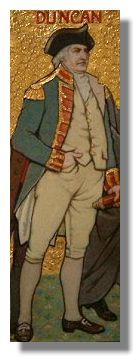 Born at Lundie, Angus on July l, 1731, his father was a merchant and Provost of Dundee.
Born at Lundie, Angus on July l, 1731, his father was a merchant and Provost of Dundee.
Duncan entered the navy in 1746. He was present at the actions of the Basque Roads (1757), Goree (1758), the blockade of Brest (1759) and commanded HMS Valiant at Havana (1962. After his return to Great Britain, he saw no further active service until 1778, when he was appointed to HMS Suffolk. In 1782 he became first lord of the Admiralty, and in the Blenheim took part in the relief of Gibraltar.
In 1795, promoted admiral, he hoisted his flag on the Venerable as commander-in-chief in the North Sea. On October 11, 1797, he obtained a decisive victory over the Dutch fleet off the village of Camperdown - for which he is rightly famous.
Earlier, Duncan had blockaded the Dutch at the Texel with only the Venerable, Adamant, and three small vessels, while 95 enemy ships lay inside the port. This blockade was a triumph of audacity and courage. By confusing signals and changing flags he made the Dutch admiral, De Winter, believe that a great fleet was in the distance. In September the Dutch gave up the idea of embarking troops, and Duncan was driven home by storms to Yarmouth to refit.
On October 7, De Winter's fleet came out and stood along the Dutch coast towards the Maas. Duncan hastened to sea with 16 ships of the line and went over to the Texel to get in the line of the Dutchmen's possible retreat. The enemy were sighted on the morning of October 11 and the signal was hoisted that the fleet should head towards them in a line of bearing, each ship engaging an enemy. The signals were obscured and not well understood, and subsequent signals did not bring the fleet into formal order.
The Dutch were drifting slowly towards the shallows and the wind was driving straight on shore in dark and rainy weather. With fine tactical insight, at about a quarter to twelve in the day, Duncan signalled the whole fleet to close the Dutch line, push through its gaps, and engage to leeward, i.e. to pass through between the Dutchmen and the shore. It was a bold step, for the coast was not far distant.
Vice-admiral Onslow attacked the Dutch rear. Duncan himself passed through the line, firing both broadsides, in the thick of the battle and fighting against odds. The Venerable, Duncan's flagship, was hulled by 45 shot between wind and water, and became almost unmanageable. For an hour the situation was extremely critical, but Onslow, who had by this time smashed the Dutch rear, came to Duncan's aid in the centre, where the Dutch ships were beaten to surrender, and the victory was decisive, destroying the Dutch navy. Nine of the enemy ships sank, others fled, and most of those that escaped were severely damaged. An end was put to Dutch hopes of invading England.
For his great victory, he was awarded a pension of £2,000 and created Baron Duncan of Lundie and Viscount Duncan of Camperdown. His son, made Earl of Camperdown in 1831, was responsible for the splendid mansion now in Camperdown Park in the city was named in honour of his success in that battle.
Duncan died suddenly August 4, 1804.



